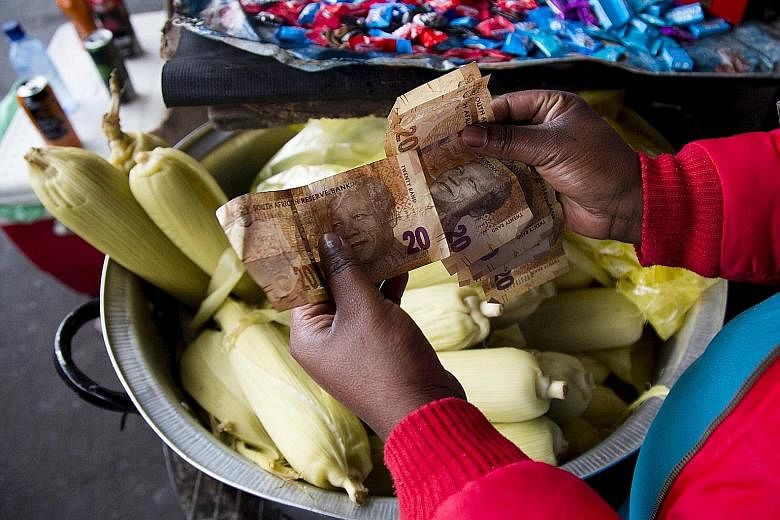JOHANNESBURG • Years of rapid economic growth across sub-Saharan Africa fuelled hopes of a prosperous new era.
To many, the world's poorest continent was finally emerging, with economies that were no longer dependent on the fickle global demand for Africa's raw resources.
But as China's economy slows and its once seemingly insatiable hunger for Africa's commodities wanes, many of the continent's economies are tumbling, quickly.
Since the start of this year, the outlook across the continent has grown grimmer, especially in its two biggest economies, Nigeria and South Africa.
Their currencies fell to record lows this month as China, Africa's biggest trading partner, said imports from the continent plummeted nearly 40 per cent last year.
"We can see what drove the growth in Africa when demand goes away," said Mr Greg Mills, the director of the Brenthurst Foundation, a Johannesburg-based economic research group.
"Well, demand has gone away, and it's not pretty."
The International Monetary Fund has in recent months sharply cut its projections for the continent. Credit rating agencies, too, have downgraded or lowered theiroutlook on commodity exporters such as Angola, Ghana, Mozambique and Zambia.
Weakening currencies will make it harder for Nigeria - and many other African governments - to repay China for loans used to build large infrastructure projects. The downturn is also reverberating across private businesses, large and small.
As the slumping economies have underscored the continent's growing vulnerability to changes in China, they have quieted much of the heady talk of "Africa rising", a catchphrase that symbolised the continent's fortunes. Growing consumer demand and an emerging middle class, while real in many African nations, are insufficient to offset a fall in the continent's main driver of growth, which remains commodities.
But experts also see bright spots on the map. While previously high-flying commodity exporters have been hit hardest by China's slowdown, other countries are showing greater resilience.
"The 'Africa rising' narrative wasn't true, but neither is the diametrically opposed argument that Africa is no longer rising," said Mr Simon Freemantle, a senior political economist at Standard Bank, a South African bank. "The truth is obviously in between."
Mr Freemantle said East African countries, including Kenya and Ethiopia, which have been forced to diversify their economies in part because of their dearth of commodities, will probably continue to enjoy robust growth.
Last month, at a summit meeting in Johannesburg with most of Africa's leaders, Chinese President Xi Jinping pledged US$60 billion (S$85 billion) in development assistance to the continent and promised to support "Africa in achieving development and prosperity".
Zimbabwe's President Robert Mugabe, who is chairman of the African Union, heaped praised on China as a counterpoint to Western powers. Many delegates at the meeting said China, unlike the West, treated Africans as equals.
But with the impact on Africa of China's downturn and a growing trade imbalance - China exported US$102 billion to Africa last year but imported only US$67 billion from the continent - sceptical voices are increasing.
"The Chinese are not romantic any more about their relations with Africa - far from it," said Mr Ibbo Mandaza, a political analyst and businessman in Zimbabwe. "For them, it's purely economic."
Ms Edith Nawakwi, a former finance minister in Zambia and now leader of an opposition party, said large infrastructure projects were often wasted opportunities that failed to lead to economic development. African leaders, Ms Nawakwi said, could have asked the Chinese to build infrastructure that would have furthered regional integration, business and trade.
"What we need is a change in the way we approach China," Ms Nawakwi said. "You get from China what you ask for."
NEW YORK TIMES

